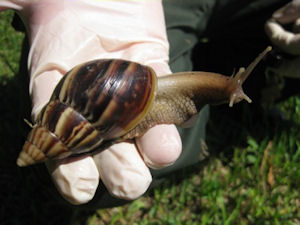KNOXVILLE, TENN.—As the giant African land snail invades southern Florida, the Florida Department of Agriculture and Consumer Services (FDACS) has done extensive research on the eradication of this pest and has identified a number of ways to eliminate it. One product it recommends that pest control companies and residents can use is Nisus Corp.’s Niban Granular Bait, an environmentally friendly product already heavily relied upon in the professional pest management industry for the control of slugs and snails as well as other common pests.
Eighteen months after a Miami-Dade County outbreak, the giant pest is spreading rapidly; one giant snail can produce 100 eggs per month, live more than eight years and grow to more than 6 in. in shell size. The snails can carry disease and are a danger to crops, as they consume at least 500 different kinds of plants. They even threaten structures while munching on stucco and concrete in their search for dietary calcium.
Niban features a borate mineral salt as its active ingredient combined with bait made from corn cob granules mixed with oils, sugars and other food grade attractants. Once the snails consume the bait, the borate acts by interfering with their metabolic ability to break down sugars to extract energy from their food; as a result, their cells “starve” and they die.
According to Nisus Corp., Niban remains effective in heat, sunlight and 4 in. of rain, so this weatherized bait keeps working even in Florida’s climate. When FDACS’ applicators that are trained in controlling the giant African Land Snail use Niban, they apply it at an “application rate of 3.2 ounces (2/3 cup) to 6 ounces of granules per 100 square feet. The bait can be reapplied every four to six weeks, as needed.”

Leave A Comment